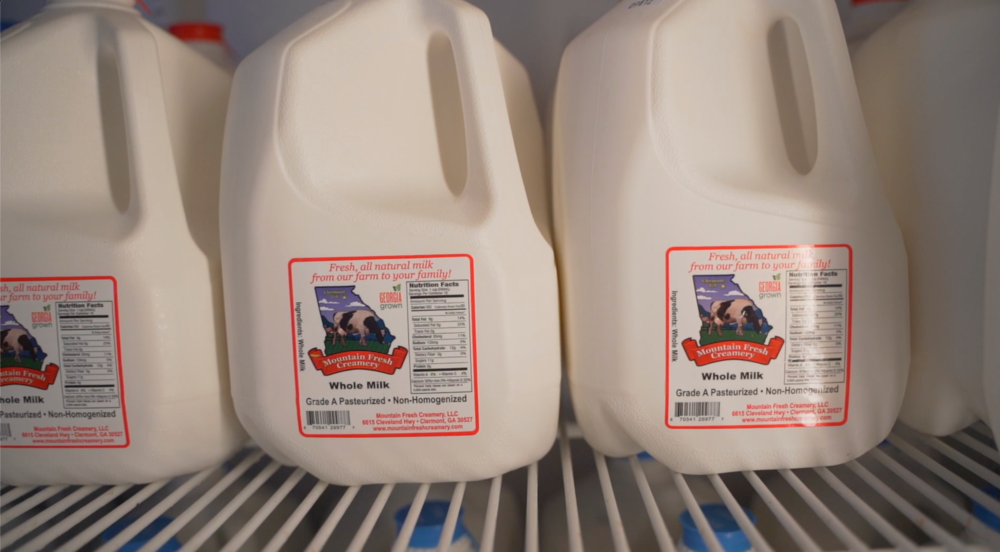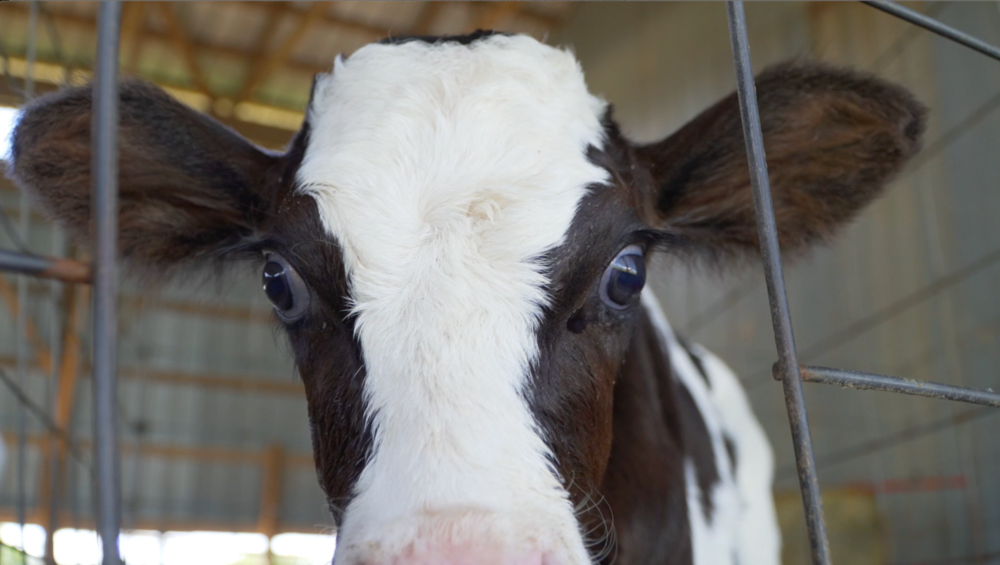
Section Branding
Header Content
A Fork in the Road Podcast: Mountain Fresh Creamery
Primary Content
A dairy in the North Georgia mountains sells some of the freshest milk and ice cream around. Plus, their special process allows some lactose-intolerant people to enjoy dairy products again. In this episode, we make a visit to Mountain Fresh Creamery.

TRANSCRIPT:
Scott Glover: By being non homogenized, the fat particles are left in their natural state, so the body can recognize that and utilize the fat and the fats where all the nutrients are right in the milk.
Jennifer Glover: And I think a lot of folks are really looking to knowing where their food comes from, knowing how that house treated, knowing the lifestyle that that cow has. And I think that's important to a lot of milk drinkers, too.
David Zelski: It is good for your bones. It is good for your teeth. It helps you grow big and strong. It does your body good. Yes, I'm talking about milk. Humans have been drinking the milk of other animals for over 6000 years. So do I really think I can host a podcast that tells you something you don't already know about milk? Yes, I do.
Theme Song: I came from the mud, there's dirt on my hands. Strong like a tree, there's roots where I stand.
David Zelski: I'm David Zelski, and this is the Fork in the Road Podcast, featuring the stories from Georgia's farmers, fishermen, merchants, artisans, chefs, and others who helped provide Georgia grown products to folks in the Peach State and beyond. Today, we're about halfway between downtown Gainesville and Babyland General Hospital in Cleveland, in the north Georgia town of Clermont. This is where we'll find the Glover family, owners of Mountain fresh Creamery.
Scott Glover: Well, we started milking cows in 2000 on our own on a rented facility, and we milked there for about seven or eight years. And we started realizing and seeing how the dairy business is starting to change a little bit. So we were looking for ways to maybe add some value to what we were doing, and we knew we couldn't grow, so we didn't want to milk a lot of cows, really could milk a lot of cows. So we started looking at other ways that we could add some value to what we were doing. And we got to thinking about, you know, the quality of milk that our cows produce and the hard work and effort that we put into it. We just thought it made a lot of sense to start looking at bottling our own milk. And so we we put a lot of thought into that and we decided to go that route and we built Mountain Fresh Creamery and opened it up in 2011.
David Zelski: That is Scott Glover. Scott and his wife Jennifer own Glo-Crest Dairy, and they sell the dairy's milk through Mountain Fresh Creamery.
Producer: Okay, David, they milk the cows and they sell the milk. That's a wrap on this episode.
David Zelski: No, there's more. It's not that simple.
Jennifer Glover: All of our products are non homogenized and low temp pasteurized.
Scott Glover: Our process here, as Jennifer stated, we we do vat pasteurization process so.
Jennifer Glover: 100% A2A herd.
Scott Glover: A2A2.
Jennifer Glover: A2A2 herd.
David Zelski: See what I mean? We have a lot to learn. And don't fret. We're going to cover it all. And let's start with what makes Mountain Fresh Creamery different.
Jennifer Glover: All of our products are non homogenized and low temp pasteurized, so it's a product that's much like the way milk is intended by nature. So it's easy for the body to digest and it retains that natural flavor of milk.
Scott Glover: Yeah. So when when we get ready to bottle milk here at the creamery, we'll go, we'll go to the dairy and, and get our milk. And the unique thing is we our milking times at the dairy are 8am and 8pm. So we'll go get the milk in the morning and it's from the night milking. So we'll bring the milk over and our process here, as Jennifer stated, we, we do a vat pasteurization process. So all the milk that we bring over, we do 600 gallons at a time. So we're able to put the milk in the vat and we have to heat it to 145 degrees. We have to hold it for 30 minutes and then it's legally pasteurized. And once it's pasteurized and it goes straight into the filler where we put it in our jugs and our bottles.
David Zelski: Now we understand a little more of the process of low temperature pasteurization, but that doesn't help me with the why.
Scott Glover: Well, I think that, you know, really overall milk now, conventional milk that you buy in a grocery store where everything's processed the same way. So it's heated to high temperatures, it's homogenized. And our products are you know, they're they're completely different. So we you know, by doing the low temp pasteurization process, it really preserves a lot of the good enzymes and bacteria that's in the milk. But the non homogenization process is really what's key. By being non homogenized, the fat particles are left in their natural state. So the body can recognize that and utilize the fat and the fat's where all the nutrients are all right in the milk.
Jennifer Glover: And I think a lot of folks are really looking to where knowing where their food comes from, knowing how that cow is treated, knowing the lifestyle that that cow has. And I think that's important to a lot of milk drinkers, too. Another thing is how fresh our milk is. Our tagline for our products is milk so fresh that the cow doesn't even know it's gone. And that's pretty true because we're bottling our milk from either our morning or our night milking. And we bottle Monday through Friday every day and our cows are milked every day, seven days a week. So that's some pretty fresh milk.
David Zelski: That is fresh milk. And let me just go ahead and say, yes, they make ice cream out of it, but don't let your thoughts of delicious, creamy hand-dipped ice cream get us off track. Jennifer mentioned that a lot of people like to know how the cows are treated. I believe pampered is the correct word for it.
Scott Glover: You know, all the technology that we have now, we took full advantage of that when we built Glo-Crest at our new location five years ago. So that was our freestyle barn. Our cow spend a good bit of time in there, especially during the summer months. We have the fans, the misters, everything is on the thermostat. So we try to keep our cows as cool and comfortable throughout the summer as we can, and we take advantage of of the pastures outside at night and in the winter time the cows spend a great deal more time outside. But we still have the barn for the nasty cold winter weather that we get. And so we still have a good place to keep the cows and are able to better take care of them and keep them more comfortable.
David Zelski: And that's not all.
Jennifer Glover: So, our cows have water beds and they get cleaned twice a day during our milking with fresh sawdust and shavings. And we do that just so it helps regulate their body temperature on those hot days. And it also makes them comfortable. So kind of like having to Glo-Crest Dairy for a cow. It's kind of like a day at a day spa.
David Zelski: Like a day spa for cows. One thing I really like about Scott and Jennifer is their attention to detail when it comes to the cows and the milk.
Jennifer Glover: So we're 100% Holstein herd. All of our cows are females and we raised them all on our farm. We're doing a couple of different practices right now where we're working towards having a 100% A2A herd.
Scott Glover: A2A2
Jennifer Glover: A2A2 herd, which is a milk protein that's found in milk. We're working towards that as part of our farming practices. Another thing that's real important to us is our sustainability practices that we have on our farm and that we hope to continue those from generations so that farm can stay in our family. Well, we love to have folks come in. We've established quite a client base in the North Georgia mountains and anywhere from Atlanta north. We sell our products in grocery stores and coffee shops and restaurants. So we get a lot of pride when people come in and say, Oh, we had your milk, we found your milk at Ingles, we found your milk at Publix. We wanted to come out and visit you to tell you how much we enjoyed your product. And we also have a lot of folks that are lactose intolerant that can drink our milk because of the non homogenization. And so that gives us a really good feeling, knowing that people are able to experience dairy that haven't been able to in a while.
David Zelski: Yep, You heard correctly, the way that Mountain Fresh Creamery processes their milk allows for some lactose intolerant people to enjoy dairy products. And you can visit them in Clermont and see it all for yourself.
Jennifer Glover: So when we built Mountain Fresh Creamery in 2011, we soon realized that most of the public was far removed from where their food comes from. So people would come in to get an ice cream or buy a gallon of milk, and they wanted to see the cows and kind of see the process that the cows go through every day to get milked twice a day and kind of how they live. So we decided to open our farm for tours and we've been doing that since 2014. We like to have people come out. We do farm tours and school groups that come out. They can see the cows being milked. They can see the comfort that our cows receive and then get to taste some of that high quality product that we have here at the creamery.
David Zelski: I believe you're never too old for a field trip. And at Mountain Fresh Creamery you can get a good look at how it all works.
Scott Glover: All right, So when the cows are being milked in the parlor, the milk flows into a receiving jar in the front of the pit. So then it's pumped from there into the tank room, which is the room that we're standing in. But the milk actually goes through, first of all, a filter housing, which filters the milk for any impurities or anything that might have gotten into the milk from the cow to the milking machine. Then it goes in through this pipe into this, which is called a plate cooler. And the plate cooler actually interacts, it's got well water coming in on one side of the plate, milk on the other. So it will actually cool the milk down to whatever the temperature of our well water is. So we're taking the milk from about 101 degrees straight out of the cow down to about 60 right now. So that really saves us a lot on our energy costs for when it goes into the bulk tank. Then that milk's cooled on down to about 37 degrees. So it doesn't have to work as hard or that the compressors don't have to run as much to get the milk to the temperature of where we want to hold it. So a lot of the things that I've learned is a lot of technology or how technology has evolved, the the importance of what we do, how we do it. But probably one of the biggest things is that, you know, how important it is for us to take as good a care of our animals because they're the ones that are producing this this product, which is, you know, an all natural milk and, you know, and if they're not well taken care of and well fed, they're not going to produce a high quality product. So we really want to we really do our due diligence when it comes to taking care of our animals and making sure that they're handled properly, fed properly. And that way we got a really high quality milk to sell at the end of the day.
David Zelski: Scott and Jennifer are passing that love and desire to take care of the cows down to the next generation. And when you come take a tour, you will probably notice some of the awards and ribbons.
Scott Glover: Well, our daughter Eliza has been showing commercial dairy calves for probably about the last seven years, and so she's done real well with that. Put a lot of time and a great deal of commitment.
Eliza Jane Glover: Okay, So every cow on this whole dairy, all 200 acres, are all girl cows. So you will only see girl cows here. We might be a little biased about our girl cows, but they're way better right now.
David Zelski: How old are these?
Eliza Jane Glover: Okay, so this cow is two days old. And then we have about four days old. Five days old. And then about a week old.

David Zelski: How often are you out here?
Eliza Jane Glover: I'm out here two times a day at 630 in the morning and 630 at night.
David Zelski: I bet people love seeing all the cows.
Eliza Jane Glover: Yes.
David Zelski: What are the reactions you get from kids?
Eliza Jane Glover: Most kids are kind of scared because, I mean, people have never really seen dairy cows, especially baby one before. And but most kids. I mean, these cows are just so loving. They're so kind, they're so just gentle. And we just love to I just love to be around them. Personally, I think I have the best job here on the dairy.
Scott Glover: So Eliza Jane has really taken a liking to to the dairy, and she's been a great deal of help for us. As she's gotten older, she spends a good bit of her weekends working on the farm and a lot of time in the afternoons as well.
David Zelski: We have learned how well the cows are taken care of. We've learned about the technology and the knowledge that goes into the process. And we've learned that when those things are put together, you get a superior dairy product. So I guess there's just one thing left to mention.
Jennifer Glover: So we use our cream when we separate from our low fat milk that we bottle at the creamery to make our ice cream. So we combine that high content cream with our high content milk and we make an ice cream mix. We make hand-dipped ice creams here and milkshakes with our milk and ice cream out of the silo. It's open year round now and we serve a lot of ice cream out of that window
Kid: I will get a waffle cone with two scoops, the bottom scoop being chocolate and the top one being birthday cake with sprinkles on it.

Scott Glover: Nowadays, on a hot summer day, you can combine and they'll be lined out to the road, waiting together, waiting to get an ice cream.
David Zelski: About some of the flavors you'll have.
Jennifer Glover: So we try to use all local inclusions in our products. So we use Georgia peaches, Georgia strawberries, and of course Georgia pecans in our salted caramel ice cream and our butter pecan, which are both really big favorites in this area. But we have chocolate, vanilla, chocolate chip, mocha cappuccino, which is a great coffee, chocolate flavored ice cream. And then our kids seem to love the cotton candy and the birthday cake.
David Zelski: Strawberry and peach.
Jennifer Glover: Strawberry and peach, too. We have strawberry and peach that are local to our area.
David Zelski: Yum. Just a quick note. Mountain Fresh Dairy doesn't call it a drive thru window. It's a moo-thru. The next time you find yourself in need of a family field trip or just have the hankering for two scoops of some incredibly fresh hand-dipped ice cream. Make your way north to Mountain Fresh Creamery in Clermont, Georgia. Imagine yourself snuggled up on the couch with a plate of warm cookies and ice cold fresh milk, and watching A Fork In The Road on GPB-TV or any time on the GPB.org website. That's where you'll also be able to listen and subscribe to this podcast or download it on your favorite podcast platform. I'm David Zelski. Thanks for listening to A Fork in the Road.
The A Fork in the Road TV show airs Saturdays at noon and Sundays at 6:30 a.m. on GPB-TV. Check your local listings for other replays throughout the week and watch all episodes anytime at GPB.org/ForkintheRoad. Please download and subscribe to the Fork in the Road podcast at GPB.org/ForkintheRoadpodcast or on your favorite podcast platform as well.






